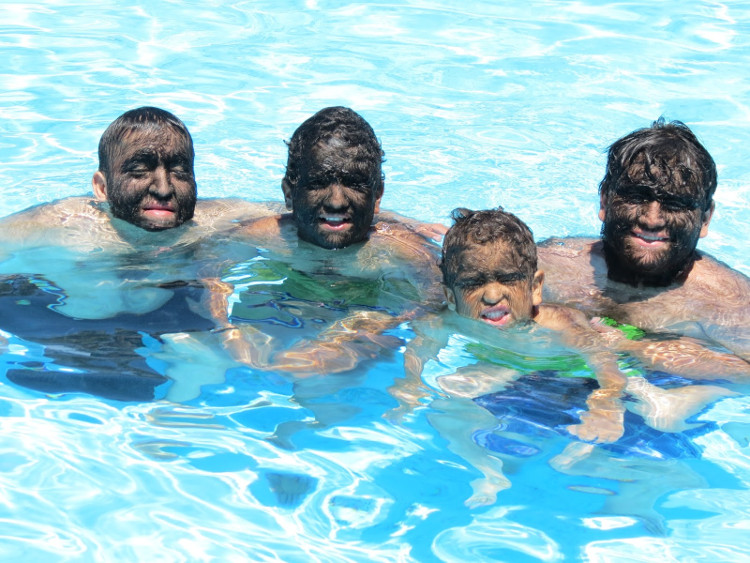Modern 'werewolf' and the most bizarre syndrome on the planet
In the past 300 years, only about 50 cases of rare syndromes have caused many people to cry out in fear.
'Werewolf' in modern times
Jesus Aveves in Loreto city, Mexico is born with a thick coat covering its face. Since he was a child, he was ridiculed and alienated by people around him. Inferiority, Jesus always tries to escape the crowd. He did not like going out, at school he was bullied by other children, they pulled hair on his face and called him 'werewolf'.

Jesus Aceves (leftmost) and family members have strange 'werewolf' syndrome.
His self-esteem also began to increase as he became a young man. Now even when Jesus is over 40 years old, sometimes he still has moments of frustration, shame, even powerlessness.
People around boycott the Aceves family. They also asked his family to live in the forest like wolves. Seeing Jesus and his relatives, many people sign, pray and curse as if his family is a devil. Some people even kill the pets of the "werewolf".
Not only did Jesus Aveves, about 30 members in the Aveves family had the same syndrome. This is considered the most popular family in the history of mankind. Their life became the subject of the famous documentary 'Chuy, The Wolf Man' directed by Eva Aridjis, released in September 2015.
The most frightening syndrome in the world
Werewolf syndrome (or Ambras syndrome) occurs when hair develops abnormally in the human body, the world's most rare form of disease with a probability of 1 / 1,000,000 people. Worldwide, in the past 300 years, there are about 50 cases, including the Aceves family, with this rare syndrome.
Children born with this disease carry some traces of human ancestors, such as long tail or nails, or most commonly, hair and long hair.
Aceves's grandmother was the first in her family to have a genetic mutation that caused the 'werewolf' syndrome, so far half of her descendants have excess hair on their bodies. No one knows the cause of this disease and there is no cure yet.
According to research results, the Aceves 'werewolf' syndrome is located in the X chromosome, meaning that the men who carry the gene mutation in the family will inherit all their daughters. but boys do not, and women with genetic mutations in the family will inherit half of the children, whether male or female.
Scientists have also studied Aceves and his family, who are particularly interested in hair surplus because they want to find a cure for hair loss for people with baldness. However, it is difficult to show which gene carries the mutation, either the recessive gene or the dominant gene.
While waiting for science to find a cure, to integrate with the community, the Aceves find ways to erase the hair. Women have thinner hair on their face, but for men with dense hair on the nose or eyelids it is difficult to interfere with advanced hair removal technologies.
'Medicine has yet to find a radical cure for' werewolf 'syndrome. People can reduce symptoms by bleaching, shaving or epilating. In addition, using lasers is also an effective way , 'said Dr. Ralph Trueb, an expert at Zurich Medical University in Switzerland.
- The tragedy of 'werewolves' is treated like animals
- Legend of werewolves
- Strange diseases
- Strange diseases discovered in the 21st century
- The Quang Binh boy grew hair like a werewolf
- Real-life and Monster version
- The 20 most unusual and rare diseases in the world
- The most feared strange diseases in the world
- The syndrome is allergic to orgasm
- Psychedelic fake souls that people often see ghosts?
- Misophonia: Strange syndrome causes people to be 'allergic' to the sound of chewing and breathing
- The 5 most bizarre disorders in the world
 Green tea cleans teeth better than mouthwash?
Green tea cleans teeth better than mouthwash? Death kiss: This is why you should not let anyone kiss your baby's lips
Death kiss: This is why you should not let anyone kiss your baby's lips What is salmonellosis?
What is salmonellosis? Caution should be exercised when using aloe vera through eating and drinking
Caution should be exercised when using aloe vera through eating and drinking